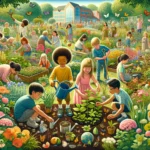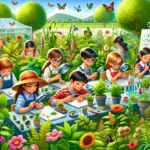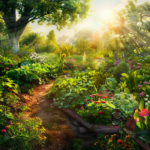Benefits of Gardening with Your Children
Abstract
Gardening emerges as a transformative practice that extends beyond horticulture to influence educational, emotional, and social dimensions of life. This post explores how gardening acts as a foundational tool for enhancing ecological literacy, promoting scientific curiosity, nurturing emotional well-being, and strengthening community and family bonds. Through hands-on interaction with the natural world, individuals gain a deeper understanding of environmental stewardship, develop critical thinking and collaboration skills, and foster a sense of connection and responsibility towards nature and each other. Highlighting the multifaceted benefits of gardening, this discussion underscores its significance in fostering a culture of growth, empathy, and sustainable living.
Introduction
Embarking on the art of gardening unfolds a world where nurturing plants becomes a catalyst for nurturing knowledge, emotional well-being, and communal ties. This exploration delves into the profound impacts of gardening, from bolstering ecological understanding and sparking scientific curiosity to fortifying emotional health and cementing family bonds. Gardening transcends traditional boundaries of education, offering a holistic approach to learning that intertwines with the natural world. It invites us to cultivate a deeper connection with the environment, encourages the growth of resilient communities, and fosters a shared sense of stewardship and care, laying the groundwork for a harmonious and sustainable future.
Cultivating Environmental Literacy and Care through Gardening

Gardening offers fertile ground for nurturing young minds, cultivating a profound connection with our planet through hands-on learning experiences. This series explores the transformative power of gardening in educational settings, emphasizing its role in enhancing ecological understanding, fostering emotional connections with nature, and embracing diverse cultural perspectives. Through these discussions, we illuminate how gardening education can shape responsible, empathetic individuals who appreciate the intricate web of life and the importance of environmental stewardship.
Enhancing Ecological Understanding with Hands-on Gardening Activities
Integrating hands-on gardening into education, as demonstrated by studies [1] and [3], enriches children’s ecological understanding. Through activities like planting and nurturing seeds, young learners engage directly with the life cycles of plants and the essentials of water, sunlight, and soil. This immersion in the gardening process not only deepens their connection to the environment but also instills a sense of responsibility towards nature. While [8] suggests that attitudes towards gardening may not shift significantly, the increased knowledge about plants and food production underscores gardening's role in building foundational ecological literacy. Gardening becomes a dynamic classroom, fostering not only environmental awareness but also promoting health and well-being.
Fostering Emotional Connections and Responsibility Towards Nature
Research, including findings from [5], highlights how gardening cultivates emotional bonds between children and nature, fostering a deep-rooted sense of environmental stewardship. Early experiences in nature, such as caring for a garden, contribute to developing a lifelong appreciation for the natural world. Gardening activities offer practical lessons in care, patience, and responsibility, enabling children to witness the direct impact of their actions on plant growth and health. The engagement with living plants enhances children’s mental well-being [13] and promotes a nurturing attitude towards the environment, reinforcing the importance of conservation and sustainability from a young age.
Embracing Inclusive and Cultural Perspectives in Gardening Education
Gardening education that embraces diverse cultural perspectives enriches the learning experience by integrating a wide range of environmental stewardship practices and knowledge systems. Insights from [18], [19], and [23] highlight the importance of incorporating various cultural narratives and indigenous knowledge into gardening practices to foster a comprehensive understanding of ecological sustainability. Johnson's work [23] suggests that reconceptualizing gardening in education can promote inclusivity and support new pedagogical approaches that align with international commitments to environmental protection and ecological understanding. This inclusive approach encourages respect for different environmental stewardship traditions, underscoring the universal importance of caring for our planet. By exposing children to diverse perspectives on gardening and sustainability, we prepare them to become empathetic global citizens equipped to engage with the world's environmental challenges through a rich tapestry of cultural lenses.
Key Takeaways
Gardening education profoundly impacts children’s ecological literacy, offering them hands-on experiences that deepen their understanding of the natural world and their role in it.
Emotional connections fostered through gardening activities encourage a nurturing attitude towards the environment, instilling a sense of responsibility and care for nature from a young age.
Inclusive gardening education, which integrates diverse cultural and indigenous perspectives, prepares children to become global citizens who value and engage in environmental stewardship.
Fostering Scientific Curiosity and Learning

Garden-based learning serves as a pivotal avenue for igniting scientific curiosity and deepening students’ understanding of the natural world. This section explores how engaging with the environment through gardening can enhance knowledge of plant biology and ecosystems and cultivate vital observation and experimentation skills, turning the garden into a dynamic classroom where scientific principles come to life.
Exploring Plant Biology and Ecosystems
The introduction of garden-based curricula into early childhood education presents a unique opportunity to instill a profound understanding of plant biology and ecosystems in young learners. Reference [24] outlines a year-long study involving a cotton project that engaged 4- to 6-year-old children in South Korea, illustrating the significant impact of gardening activities on fostering scientific and nature-friendly attitudes. This immersive experience allowed children to witness firsthand the life cycle of cotton, from seed germination to plant maturation, thereby enhancing their curiosity and fostering a deeper appreciation for the complexities of plant life and the interconnectedness of ecosystems. The process of planting, caring for, and observing the growth of cotton plants served as a practical exploration of ecological concepts, emphasizing the importance of environmental harmony and the value of nature as a space for discovery and learning. The study underscored the critical role of educators in facilitating this connection, highlighting how guided observations and discussions can amplify children's understanding of biological processes and ecological balance. This approach not only cultivates a scientific mindset but also instills a sense of responsibility towards the preservation and appreciation of the natural environment, laying the groundwork for future generations who are knowledgeable about and committed to environmental stewardship.
Developing Observation and Experimentation Skills
The hands-on nature of garden-based learning is instrumental in developing key observation and experimentation skills among young children, as demonstrated in the research conducted by [25]. This case study delves into the experiences of preschool and kindergarteners engaged in gardening activities within a model outdoor classroom in the Midwest. It reveals how these interactions with the garden and greenhouse not only facilitate knowledge acquisition about the environment but also significantly enhance children’s capacity for observation and critical thinking. Engaging with living plants and participating in gardening tasks such as planting, watering, and observing growth cycles, children learn to notice subtle changes, understand cause and effect, and make predictions based on their observations. These activities are vital for developing scientific skills, fostering a methodological approach to inquiry that is fundamental to the scientific process. Moreover, the study highlights how gardening activities contribute to emotional and social learning, including communication of knowledge and emotions, thus providing a holistic educational experience. The garden becomes a dynamic environment where scientific exploration is naturally integrated with emotional growth and social interaction, reinforcing the garden's role as a comprehensive learning space. This integration of gardening into the educational framework not only enhances children’s scientific literacy but also prepares them to approach the world with curiosity, empathy, and a readiness to learn and discover.
Key Takeaways
Garden-based learning crucially advances children’s scientific curiosity and understanding of ecosystems, while fostering observation and experimentation skills. Through practical engagement, students learn to apply scientific methods in real-world settings, nurturing a comprehensive scientific mindset. At HorizonLecture, we support this immersive approach, recognizing its role in shaping informed, environmentally conscious individuals prepared to contribute to sustainable futures.
Enhancing Emotional Well-being and Responsibility

Gardening extends beyond the physical nurturing of plants to significantly enhance emotional well-being and instill essential life values. This section delves into the therapeutic aspects of gardening as a stress reliever and source of joy, and its role in teaching patience, care, and responsibility. Through the lens of gardening, we explore how these activities cultivate not just gardens, but also resilience, compassion, and a deep-seated sense of environmental responsibility in individuals.
Gardening as a Stress Reliever and Joy Provider
Gardening transcends mere cultivation of plants, emerging as a profound stress reliever and source of joy. Studies like [13] and [20] underscore gardening's therapeutic effects, highlighting how engagement with the soil and plant life can significantly enhance mental well-being and provide a sense of peace amidst life’s turbulence. The act of gardening — from the rhythmic digging of soil to the careful nurturing of seedlings — serves as a meditative practice, offering a momentary escape from stress and fostering a unique sense of accomplishment and satisfaction as the garden flourishes. Furthermore, [21] reveals how gardening activities are instrumental in reducing stress and enhancing emotional intelligence among preschool children, suggesting that the benefits of gardening extend across age groups, nurturing a resilient and joy-filled disposition towards life. This emotional enrichment is attributed to the intrinsic connection humans share with nature, where the simple acts of planting, watering, and tending to a garden can evoke a deep sense of joy and tranquility. The garden becomes a sanctuary, a place where stress dissipates, and joy blooms, affirming the essential role of gardening in promoting emotional well-being.
Teaching Patience, Care and Responsibility
The garden is a classroom where patience, care, and responsibility are taught through the silent yet eloquent language of nature. Reference [5] explores how early interactions with the environment foster a sense of responsibility towards the natural world, ingraining in young minds the importance of caring for life in all its forms. Similarly, [25] illustrates how gardening activities at a Midwestern early education program develop crucial life skills in preschool and kindergarteners. Through hands-on engagement with the garden, children learn the value of patience as they wait for seeds to sprout and plants to grow, understanding that care and consistent effort are key to nurturing life. This process instills a deep sense of responsibility as they realize their role in the wellbeing of the plants under their care. Moreover, the practice of gardening reinforces the notion that patience, care, and responsibility extend beyond the garden to every aspect of life, teaching children the importance of nurturing relationships, pursuing goals with perseverance, and acting as stewards of the environment. These lessons, learned in the tranquility of a garden, lay the foundation for a lifetime of compassionate and responsible living, emphasizing the role of gardening in shaping well-rounded, empathetic individuals.
Key Takeaways
Gardening emerges as a powerful catalyst for enhancing emotional well-being and fostering virtues of patience, care, and responsibility. It teaches that the cultivation of plants mirrors the nurturing of one’s inner self, offering stress relief, joy, and a profound sense of stewardship towards nature. At HorizonLecture, we champion gardening as a pathway to developing not only green thumbs but also kinder, more resilient hearts, underscoring our commitment to holistic education.
Strengthening Family Bonds and Social Skills

Gardening transcends the cultivation of plants, serving as a catalyst for strengthening family bonds and enhancing social skills. We delve here into how gardening activities foster communal joy and collaborative learning, illustrating the garden’s role as a shared space where families grow together. This exploration highlights the transformative power of gardening in nurturing not only the environment but also the interpersonal connections that bind us.
Sharing the Joy of Gardening: A Family Affair
Gardening as a family activity not only cultivates the garden but also strengthens the bonds within the family, creating shared moments of joy and learning. Studies such as [13], [14], and [16] highlight the positive impact of gardening on familial relationships, demonstrating how these shared experiences can enhance physical health, mental well-being, and emotional connections. Gardening together encourages communication and cooperation, fostering a nurturing environment where every family member can contribute and learn from each other. This communal approach to gardening reinforces the notion that collective efforts and understanding lead to greater achievements, mirroring the dynamics of healthy family relationships. Moreover, the research presented in [16] suggests that participating in nature-based activities together strengthens family connections and encourages a shared appreciation for the natural world. By engaging in gardening, families embark on a journey of discovery and growth, where the lessons learned extend beyond the garden, contributing to the development of strong, supportive familial bonds.
Collaborating and Learning Together
The act of gardening together extends beyond physical activity to become a fertile ground for collaboration and social skill development. References [5], [15], and [25] emphasize the role of shared gardening in fostering communication, cooperation, and emotional intelligence. Engaging children and adults in collective gardening tasks provides a practical framework for teaching the value of teamwork, patience, and responsibility. It offers a unique opportunity for experiential learning, where problem-solving and planning become interactive experiences that benefit from diverse perspectives. [15] further elucidates how varied shared activities, including gardening, contribute significantly to the quality of parent-child relationships, underscoring the importance of active participation and engagement in collaborative tasks. Similarly, [16] showcases the powerful bond formed between children and their parents through nature-based activities, highlighting how these experiences can deepen familial ties and promote a collective sense of achievement. Through gardening, families learn to work together, supporting each other’s growth and learning in a nurturing environment, thereby strengthening the social fabric of the family and laying the groundwork for a lifetime of cooperation and mutual respect.
Key Takeaways
Gardening unites families, fostering bonds through shared endeavors and mutual growth. It teaches collaboration, patience, and the joy of nurturing life together, reinforcing the importance of teamwork and environmental stewardship. At HorizonLecture, we celebrate gardening as a powerful medium for strengthening family connections and social skills, advocating its integration into educational practices to cultivate not just gardens, but also resilient, compassionate communities.
Conclusion
Gardening transcends the simple act of planting seeds, evolving into a profound practice that nurtures not only the earth but the fabric of our lives. It stands as a testament to the power of care, patience, and growth, illuminating the intertwined paths of ecological understanding, personal well-being, and community connection. Through the act of gardening, we cultivate more than just plants; we foster a deeper appreciation for the natural world, a commitment to scientific exploration, and a strengthening of bonds among families and communities.
This journey through the garden reveals a multifaceted experience that enriches both the individual and the collective, teaching us invaluable lessons in responsibility, sustainability, and empathy. As we delve into the soil, we unearth more than the roots of vegetation; we discover the roots of our shared humanity, creating a stronger, more resilient community bound by the shared joys and challenges of nurturing life.
In embracing gardening, we sow the seeds of a future ripe with knowledge, compassion, and interconnectedness. It’s a practice that goes beyond the garden, permeating every aspect of our existence, urging us to grow together in harmony with nature. Let this be a call to cultivate a life marked by curiosity, care, and connection, for in the act of growing together, we truly flourish, harvesting the most profound yields of all—those that nourish our souls and draw us closer to one another.


